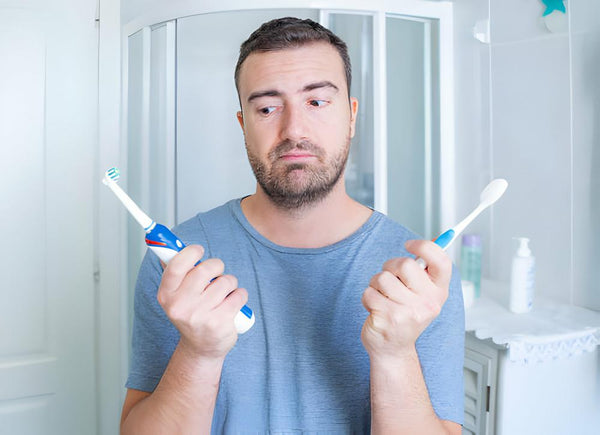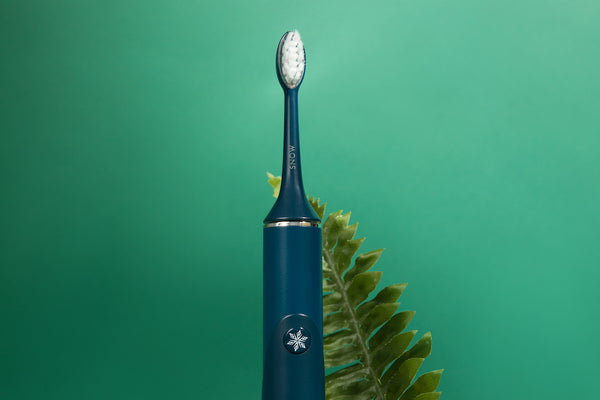Can herpes can live on a toothbrush? Yes, herpes viruses can survive on toothbrushes, but the duration is what's most important to look into. Fortunately, SNOW has all the answers you need!
So, how long does herpes live on a toothbrush? Herpes simplex virus type 1 (HSV-1) can remain viable on moist surfaces like toothbrushes for up to three hours.
At SNOW, we understand the importance of oral hygiene and the potential risks associated with herpes transmission via toothbrushes.
In this article, we'll delve into the facts surrounding herpes survival on toothbrushes and provide essential insights on oral herpes symptoms, transmission, and prevention.
Stay informed to protect your oral health and learn practical tips to minimize the risk of herpes transmission through toothbrushes.
What this article covers:- Can You Get Herpes From a Toothbrush?
- Oral Herpes Symptoms
- How to Avoid Getting or Passing Herpes Via a Toothbrush
- Why Are Cold Sores Contagious?
- What Really Happens If You Share a Toothbrush?
- How Long Are Cold Sores Contagious?
- When Is a Cold Sore No Longer Contagious?
Can You Get Herpes From a Toothbrush?
Yes, you can potentially contract herpes from a toothbrush. According to the World Health Organization (WHO), herpes simplex virus type 1 (HSV-1), responsible for oral herpes, can survive on moist surfaces like toothbrushes for a limited period.
While the risk of transmission is generally low, it's not negligible. Visible lesions or sores increase the likelihood of transmission. At SNOW, we prioritize oral health and understand the importance of minimizing such risks.
Our LED Teeth Whitening Electric Toothbrush not only enhances your smile but also promotes optimal oral hygiene. Powered by advanced LED technology, it effectively removes surface stains and bacteria, ensuring a cleaner brushing experience.

With its gentle bristles and ergonomic design, it's suitable for daily use and is gentle on sensitive teeth and gums.
Elevate your oral care routine with SNOW's LED Teeth Whitening Electric Toothbrush and enjoy a brighter, healthier smile every day.
Oral Herpes Symptoms
Oral herpes, often referred to as cold sores, manifests with various symptoms that can be distressing.
According to Johns Hopkins Medicine, these symptoms typically include tingling, itching, and painful blisters around the mouth or on the lips.
Understanding these symptoms is crucial for prompt recognition and management.
Tingling Sensation
A common early sign of oral herpes is a tingling sensation around the lips or mouth area. This sensation often precedes the appearance of visible blisters and serves as an indication of an impending outbreak.
Itching
As the herpes virus becomes active, individuals may experience itching or irritation in the affected area.
This sensation can range from mild discomfort to intense itching, leading to scratching and exacerbating the condition.
Painful Blisters
One of the hallmark symptoms of oral herpes is the development of painful blisters or sores.
These lesions typically appear as fluid-filled vesicles on or around the lips and can cause significant discomfort during outbreaks.
At SNOW, we recognize the impact of oral herpes on individuals' well-being.
Our LED Teeth Whitening Electric Toothbrush not only enhances your smile but also promotes overall oral health, reducing the risk of oral health issues.

How to Avoid Getting or Passing Herpes Via a Toothbrush
At SNOW, we understand the importance of preventing the transmission of herpes through toothbrushes to maintain oral health.
Here are some practical tips to minimize the risk:
Avoid Sharing Toothbrushes
Sharing toothbrushes can facilitate the spread of herpes viruses between individuals. It's essential for each person to use their own toothbrush to prevent transmission.
Replace Toothbrushes Regularly
It's crucial to replace toothbrushes every three to four months, especially after an outbreak of cold sores. This helps prevent the accumulation of viruses on the bristles and reduces the risk of transmission [2].
Keep Toothbrushes Dry
Allowing toothbrushes to air dry between uses can help inhibit the survival of herpes viruses. Moist environments promote the longevity of viruses, so ensuring toothbrushes remain dry can reduce the risk of transmission.
By following these simple yet effective strategies, individuals can safeguard themselves and others from the transmission of herpes through toothbrushes, promoting overall oral health and well-being.
Why Are Cold Sores Contagious?
At SNOW, we understand the importance of addressing the contagious nature of cold sores, which stems from the herpes simplex virus type 1 (HSV-1). Here's why cold sores are contagious:
Herpes Simplex Virus Type 1 (HSV-1)
Cold sores are caused by the herpes simplex virus type 1, which is highly contagious. This virus can be easily transmitted from person to person through direct contact with saliva or lesions, especially during active outbreaks.
Direct Contact
The primary mode of transmission for cold sores is through direct contact with infected saliva or active lesions. This can occur through activities like kissing, sharing utensils, or engaging in oral sex.
Indirect Contact
Cold sores can also spread indirectly through contaminated objects like toothbrushes, towels, or eating utensils. The virus can survive on these surfaces for a limited time, posing a risk of transmission to others.
Understanding the contagious nature of cold sores is crucial for preventing their spread and maintaining oral health and hygiene.

What Really Happens If You Share a Toothbrush?
At SNOW, we prioritize oral health and hygiene, and sharing a toothbrush can have significant consequences. Here's what really happens if you share a toothbrush:
- Risk of Transmission: Sharing a toothbrush increases the risk of transmitting oral infections, including oral herpes (HSV-1), bacterial infections, and even fungal infections like candidiasis.
- Oral Herpes Transmission: Oral herpes, caused by the herpes simplex virus type 1 (HSV-1), can be easily transmitted through shared toothbrushes, especially if one person has active lesions or the virus is present in their saliva.
- Other Infections: In addition to oral herpes, sharing a toothbrush can lead to the transmission of various bacterial and fungal infections, compromising oral health and overall well-being.
- Prevention: To prevent the spread of infections, it's essential to avoid sharing toothbrushes and maintain good oral hygiene practices. Each individual should use their own toothbrush and replace it regularly for optimal oral health.
By understanding the risks associated with sharing toothbrushes, individuals can take proactive steps to protect themselves and their loved ones from oral infections.
How Long Are Cold Sores Contagious?
At SNOW, we understand the importance of knowing the contagious period of cold sores for effective management. Here's the breakdown:
- Contagious Period: Cold sores are contagious from the moment you first feel the tingling or itching sensation until the scab completely heals and falls off.
- Duration: Typically, the contagious period of cold sores lasts for about 7 to 14 days. However, individual healing times may vary based on factors such as the severity of the outbreak and the body's immune response.
- Transmission Risk: During the contagious phase, it's crucial to avoid close contact with others to prevent the spread of the herpes simplex virus (HSV-1). This includes refraining from sharing personal items like utensils, lip balm, and towels.
- Healing Process: To promote faster healing and reduce the risk of transmission, it's essential to maintain good oral hygiene, avoid touching the cold sore, and consider using antiviral medications or topical treatments.
Understanding the contagious period of cold sores allows individuals to take necessary precautions to minimize transmission and promote faster healing.
When Is a Cold Sore No Longer Contagious?
At SNOW, we prioritize understanding the contagious phases of cold sores for effective management. Here's what you need to know:
- Blister Stage: Cold sores are highly contagious during the blister stage when fluid-filled lesions are present. This is when the herpes simplex virus (HSV-1) is most actively shed from the sores.
- Crusting Stage: As the blisters begin to crust over and form a scab, the risk of transmission decreases significantly. The virus becomes less accessible for transmission as it is sealed beneath the scab.
- Healing Process: Typically, cold sores are no longer considered contagious once the scab falls off and the skin underneath has fully healed. At this stage, the virus is no longer actively shedding, and the risk of transmission is minimal.
Understanding the contagious phases of cold sores empowers individuals to take appropriate precautions to prevent transmission and promote faster healing.
Conclusion
Considering the longevity of herpes on toothbrushes, it's vital to maintain proper hygiene practices.
The article underscores the importance of understanding the contagious phases of cold sores, emphasizing precautions during the blister and crusting stages.
As we navigate these insights, let's prioritize oral health by investing in SNOW's advanced LED Teeth Whitening Electric Toothbrushes. By incorporating this innovative solution into our dental care routine, we not only promote oral hygiene but also enhance our confidence with a brighter smile.
Explore SNOW's range of teeth whitening products for a radiant smile that reflects optimal health.
If you want to learn more, why not check out these related posts:
- How Often to Change Brush Head on Electric Toothbrush
- How Long Is a Electric Toothbrush Supposed to Last
- How Long Can an Electric Toothbrush Last Without Charging
- What Type of Electric Toothbrush Head Is Best
- How Long Should You Brush Your Teeth with an Electric Toothbrush
- Are Electric Toothbrush Heads Interchangeable
- How Long Does It Take for a Toothbrush to Dry
- How Long Does Bacteria Live on Toothbrush
- How Long Does It Take a Toothbrush to Decompose
- Best Electric Toothbrush for Gum Disease
- Best Electric Toothbrush for Gums
- Toothbrushes for Gum Disease
- Why Does My Toothbrush Smell?
- Hydrogen Peroxide to Clean Toothbrush
- How Long Should I Soak My Toothbrush in Hydrogen Peroxide?























